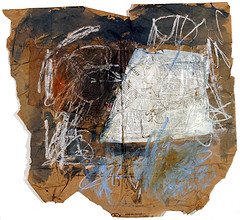
(52)
A Bag Of Fools
Today, 6 September 2006, I attended the morning session of the 42nd Postgraduate Course MASTERY IN SURGERY: Emergencies In Surgical Care, tagging along with Dr Antonio C Oposa Sr, surgeon par excellence. The course is sponsored by the Foundation for the Advancement of Surgical Education Inc with address at the Department of Surgery, College of Medicine-Philippine General Hospital, University of the Philippines Manila; it started today and will end on the 8th.
I can’t tell you anything about what the speakers said, including that of the Alfredo T Ramirez Memorial Lecturer Dr Crisostomo Arcilla Sr who spoke on 50 years of legacy in biliary surgery based on his own personal experience. What I caught him saying is that Dr Tetsuo Maki solved the problem of the ascaris worm in
What I want to share with you from the same occasion is the little poem that my newfound friend Dr Oposa recited to us, the last table to eat, that included the wife of Dr Arcilla Sr and his son named after him. By way of introduction, Dr Oposa said he was going to say something that he was sure we had not already heard or that we probably did not understand – we laughed. This is that poem:
A Bag Of Tools
R Lee Sharpe
Isn’t it strange how princes and kings,
And clowns that caper in sawdust rings,
And common people like you and me,
Are builders for eternity?
Each is given a bag of tools:
A shapeless mass and a book of rules.
And each must fashion, ere life is flown,
A stumbling block, or a stepping stone.
R Lee Sharpe was born in 1870 and lived up to 1950 (James D Sutton, docspeak.com/). For years he worked with his father who owned The Carrollton Free Press and a printing shop in
This particular poem has been reworked into music by H Johnson and B Llewellyn and retitled Book Of Rules (clearlight.com/). I don’t like what they have done with the whole poem so I won’t quote them here.
We clapped after Dr Oposa’s recitation because we all felt it fit well the occasion – the common image of a doctor is one with a stethoscope hanging on the neck and a medical bag on his right hand, his bag of tools. Still, we don’t have to be doctors to do something right with our bag of tools. About the poem, Charles A Didier says that it is about destiny, and that our destiny is in our hands (4 May 1980, speeches.byu.edu/). That’s one way of looking at it. But I don’t have to think of destiny to decide what to do with my bag of tools, my talents, my multiple intelligences (following the theory of Harvard Professor Howard Gardner). The poem has also been used as an engaging message by Lee E Brackett, President of the Jackson Union County Habitat for Humanity (juchabitat.org/) and cited in a commencement address in Tennessee by State Senator Mark Norris (2000, marknorris.org/).
Apt image from Mary Brogdan who captions it 'Grocery bag air miles / genesis' (flickr.com/). Apt because it's abstract, and what you make of it depends on you.
So, what I get from all that is this: If I don’t do right by my bag of tools, it is nothing but a bag of fools.

0 Comments:
Post a Comment
<< Home